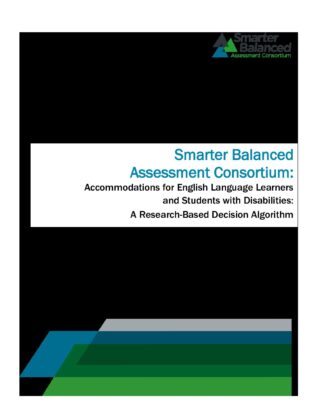Resource Hub
Explore guides, research papers, policy briefs, and tools to aid decisions on standards and assessments.
Smarter Balanced Assessment Consortium: Accommodations for English Language Learners and Students with Disabilities: A Research-Based Decision Algorithm
In this paper, the authors discuss five major characteristics that an accommodation should have in order to be considered in the assessment of ELLs and SWDs: (1) Effectiveness, it must be effective in making assessments more accessible to the recipients; (2) Validity, it should not alter the focal construct; (3) Differential impact, it must be sensitive to individual student’s background; (4) Relevance, it must be relevant to the intended audience; and (5) Feasibility, it must be logistically feasible to administer. The authors say that while all five characteristics are essential for selecting appropriate accommodations for ELLs and SWDs, effectiveness and validity deserve a greater level of attention. The authors present a summary of research for some of the most commonly used accommodations and, based on the findings of the studies, provide recommendations to help SBAC’s member states in their decisions for selecting appropriate accommodations and accessibility features for ELLs and SWDs. The paper also discusses the common notions underlying accommodation and accessibility.


Although this paper would have benefited from a clearer statement of purpose from the beginning, its purpose became clear (System for Classifying Accommodations Based on Evidence of Their Effectiveness and Validity) and was supported by well-accepted standards for development. Because this resource is well organized and presented, it is easy to read and useful for anyone interested in considering recommended assessment accommodations for ELL’s and students with disabilities. Additionally, this paper provides detail on the process and reasoning for a classification system as well as limitations. Guidance is both timely and relevant as Smarter assessments will come into greater use. While there are some limitations, such as subjectivity, to this classification of accommodations, its value remains as decisions on accommodations without any guidance risk greater chance for “altering ‘focal construct’, i.e., the outcomes of accommodated and non-accommodated assessments should be comparable.”